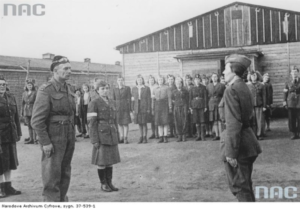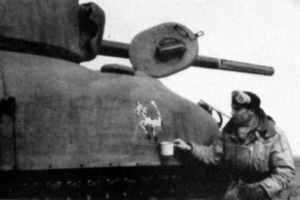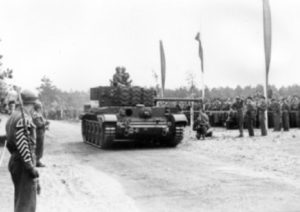
/From the archive of the National Digital Archive
It will be a story about a brave rally behind the enemy lines featuring one tank, two reconnaissance cars, one jeep and one motorcycle, which in the end liberated Stalag 6C and freed over 1700 women and girls, participants of the 1944 Warsaw Uprising.
The whole story began on the 8th April 1945, when the 2nd Armoured Regiment of colonel Stanisław Koszutski, commonly known as “Szczutek”, crossed the River Rhein.
For a moment let’s give voice to the colonel himself:
(…) The pontoon bridge shook under Polish tanks, and on the other side we were greeted by ruins of a German town, crashed by the air force and English guns. We were also greeted by the brigade commander Franek Skibiński with a newly composed song ‘Let us cross the river Rhein (…) The song was very much true, with regards both to Belgian franc, a currency valued by us, and to the slowness of our tank Sherman, but regarding the girls Franek turned out to be no prophet at all. Even to the contrary, for he did not foresee that the division would not merely fraternize [the allied soldiers in Germany were forbidden to fraternize with the local women – TB], but that it would become totally feminized like no other army in the world. Not only through incorporation of a girl military formation to their rows, but through hundreds of romances and marriages, which trailed behind on our armoured tail. And everything began very nobly, heroically, endearingly and patriotically. All that because of the 2nd Armoured Regiment (…).

/Archive of Tomasz Basarabowicz
Few days after crossing the Rhein more serious actions begun and the regiment found itself again on the territory of Netherlands, more precisely in the town of Ter Apel. Not the entire regiment, but three tanks of the Divisional Command Group, three reconnaissance cars and three motorcyclists. Front Line squadrons either got lost or for unknown reasons there was no connection with them.
And then, due to local Dutchmen, a message spread out that around 10 km further on there is a concentration or prisoner-of-war camp, where Poles are kept. No one knew whether these were political prisoners or prisoners of war, but for sure there were Poles. The camp was to be located by the road to Oberlangen. One of the Dutchmen, who freely communicated with the other side, swore that the camp was soon to be evacuated or dismantled. What did that mean? It was obvious.
The commander of the regiment had his doubts. He was ordered just to reach Ter Apel, but on the other hand he could not let something like this happen just under his breath…
A decision was made to send a reconnaissance patrol. A tank, two reconnaissance cars and a motorcyclist. In the tank: colonel Stanisław Koszutski, second lieutenant Papee, radio operator rifleman Zemlik, driver corporal Szmeller and a guest from London, lieutenant colonel Emeryk Count Hutten-Czapski. The last one visited the regiment while it were at Meuse River and, apparently, he enjoyed it, or he wanted to experience real war… He was given a 30-minute course of how to use machine gun. However, a problem arose, because lieutenant colonel Czapski was two meters tall. Nonetheless, he bravely forbore all discomforts.
In the reconnaissance cars were lieutenant Janusz Barbarski and lieutenant Kulesza, a regiment doctor with the drivers. On the motorcycle – rifleman Witkowski. In the last moment jeep of lieutenant Kozak joined the expedition, with a war correspondent Marian Walentynowicz, the famous of his children cartoon book “Matołek the Billy-Goat “.

Colonel Koszutski:
(…) A scout car of lieutenant Barbarski starts out at full speed. It races small, lonely, lost in the void of flat fields around. A single vehicle as a spearhead – no one had seen that before! The hands of the officer are clenched on the triggers of the machine gun, eyes thrusted in the area looking out for the enemy. Few minutes later move out the ‘main force’ – tank, jeep and the motorcyclist (…).
Suddenly, on the right side of the road, shots sounded from the forest. Paradoxically, everyone took it with relief. It was better than devouring silence and uncertainty of what could happen in a while. The patrol responded with fire, and after a while Germans stopped shooting. Most likely they deemed that this group of vehicles is a front guard of a strong armoured column.
Through binoculars clearly were already visible outlines of the camp watchtowers.
The colonel gives an order:
(…) Janusz [Barbarski – TB] will drive through without stopping on to the other side of the camp and from there he will protect us from the East. The doctor with the gendarme will remain here on the dune ready for further orders. My tank, with Witkowski, will try to break into the middle of the camp. In case of bumping into more serious German forces or their coming- we take to our heels. Assembly here, by the dune (…)”.
Lieutenant Barbarski drove with full speed. Behind him along the wires – the tank. From the watchtowers fall the series of the machine guns. The tank does not respond. Experienced soldiers know that the very sight of a tank will make on a poorly armed enemy the right impression. Besides, one could accidentally harm a prisoner.

On the 3rd May 1946 in Meppen, in the Polish occupation zone in Germany, marched all units of the 1st Armoured Division of General Stanisław Maczek. For the “Black Devils “, as Poles were called, it was the last such show.
Finally, the gate. The tank abruptly turns right and batters it. On its left side stands a building which looks like a guardhouse. After two series of the machine gun fire at the windows, twelve Germans with raised hands jump out of it. Rifleman Witkowski drives up to them on a motorcycle and takes them at the gunpoint of his machine gun. But from the other building, located in the front, someone is still shooting.
(…) Lieutenant colonel Czapski, we’ve got to clean this hovel. Roland [Szmeller – TB] – stop! Lieutenant colonel Czapski clambers from the tank and then he gets stuck in the manhole. Now, he has to be taken out of it. It is an awfully comical moment. Torn out of the manhole lieutenant colonel Czapski lands flat on the ground, at the feet of the Germans with raised hands. He stands up, wrestles with the revolver and finally runs to the building. After a while a German major with a sergeant comes out of it. The major gives away his gun with dignity and says: ‘I give up the camp. We are soldiers, not gestapo. I ask for appropriate treatment (…).
The tank breaks the second, internal gate. And then everyone notices a small silhouette running to us in a too long coat and… a garrison cap with an eagle and a pennant of the 7th regiment of Lublin Ulans.
– English? Francais? American? Canada sind Sie?
– Poles, Poles mademoiselle! The 1st Armoured Division, darling!
– Poles, oh God, Poles! And we’re here from the Home Army. From the Warsaw Uprising. From Warsaw.
And then from the barracks spills out a joyful crowd of women in the shreds of military uniforms.
The soldiers got speechless. But still, the Germans could come at any moment, attack and make a massacre, because all the vehicles were surrounded by hundreds of cheering women.
After a while colonel Koszutski is approached by a woman with a sign of a liaison officer. As it turns out, it is captain Lissowska, Commander of the camp. At once she orders an assembly. A fairly even rectangle is formed. The Chief orders barracks commandants to report. Barrack commandants come to her and saluting they report.
– Colonel, I dutifully report a female battalion of the defence of Warsaw. Present: 1716 soldiers on the square, 20 in the infirmary and 7 infants. Battalion, attention!
(…) I walk before the rows of the battalion. On no other inspection was I followed in such a way by the eyes of soldiers, and never I looked in soldiers’ eyes in such a way. Eyes are mostly blue and mostly very young. Mostly in tears. I cannot see so well myself, as if through a mist (…)”.
So was liberated Stalag 6C in Oberlangen. At night colonel Koszutski drove to general Maczek to report. The next day the general himself visited and greeted the camp.
And then began visits of soldiers of the entire division. Wives, daughters, sisters, closer and further families were being found. Love, romance and marriages were created. Also lieutenant Janusz Barbarski found his future wife in Oberlangen.
Tomasz Basarabowicz
Translation: Malina Samborska

Testimony of Aleksandra Diermajer-Sękowska